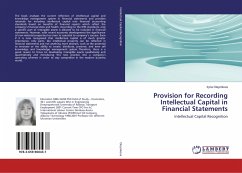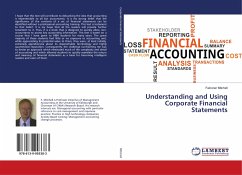
Provision for Recording Intellectual Capital in Financial Statements
Intellectual Capital Recognition
Versandkostenfrei!
Versandfertig in 6-10 Tagen
28,99 €
inkl. MwSt.

PAYBACK Punkte
14 °P sammeln!
The book analyses the current reflection of intellectual capital and knowledge management system in financial statements and provides rationale for including intellectual capital into financial accounting standards based on benefits of financial reports which reflect the company's financial state and health. According to the IFRS standards, only a specific part of intangible assets is allowed to be included in financial statements. However, with recent economic developments the significance of non-material properties has risen to essential to company's success. Even if it is now recognized tha...
The book analyses the current reflection of intellectual capital and knowledge management system in financial statements and provides rationale for including intellectual capital into financial accounting standards based on benefits of financial reports which reflect the company's financial state and health. According to the IFRS standards, only a specific part of intangible assets is allowed to be included in financial statements. However, with recent economic developments the significance of non-material properties has risen to essential to company's success. Even if it is now recognized that intellectual capital is of much greater importance, only parts, like intellectual property can be reflected in financial statements and not anything more abstract, such as the potential to innovate or the ability to create, distribute, preserve, and even sell knowledge and knowledge management system. Therefore, there is a good reason to focus on developing intangible assets qualitatively and quantitatively and introducing this new practice into a company's operating schemes in order to stay competitive in the modern business world.












